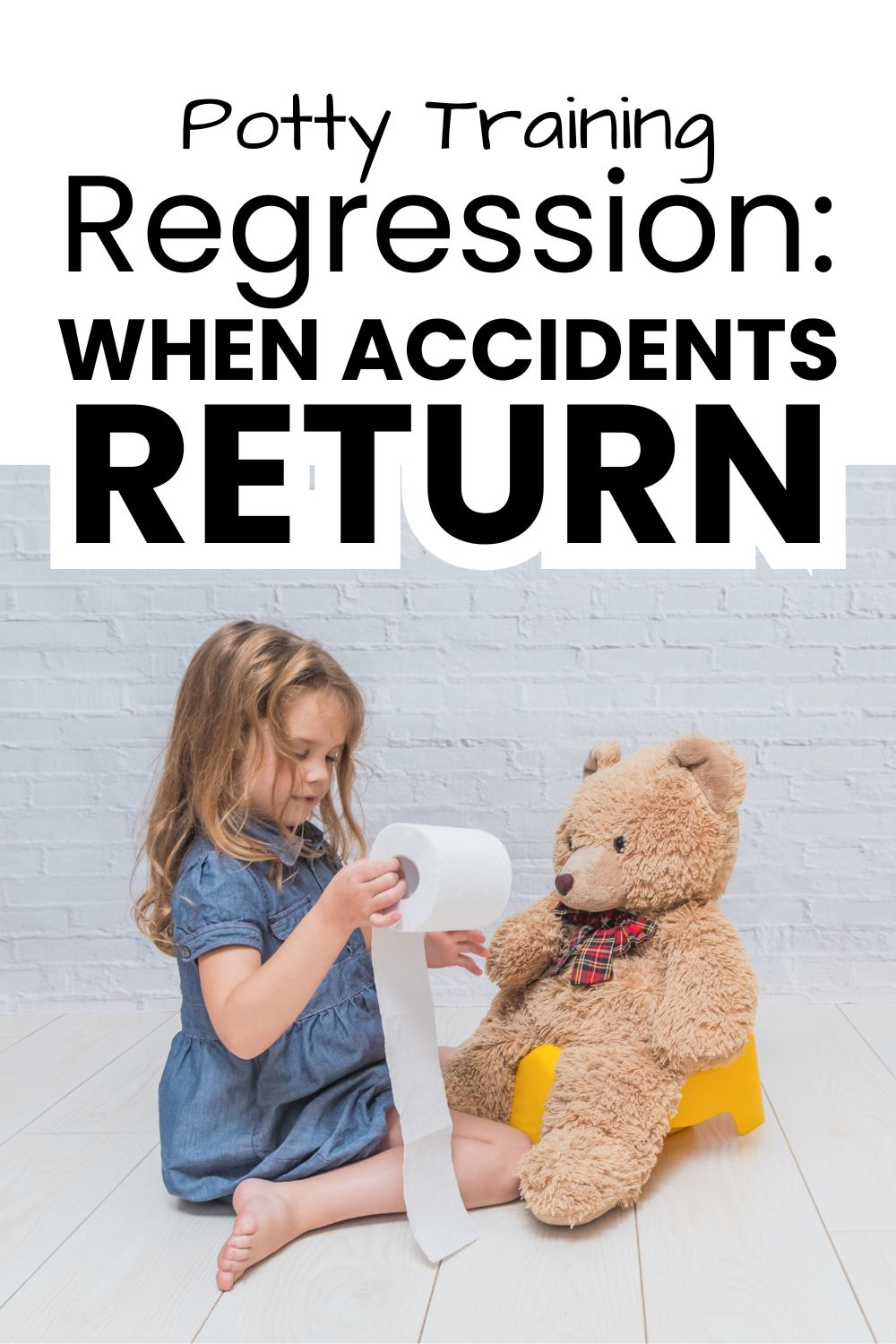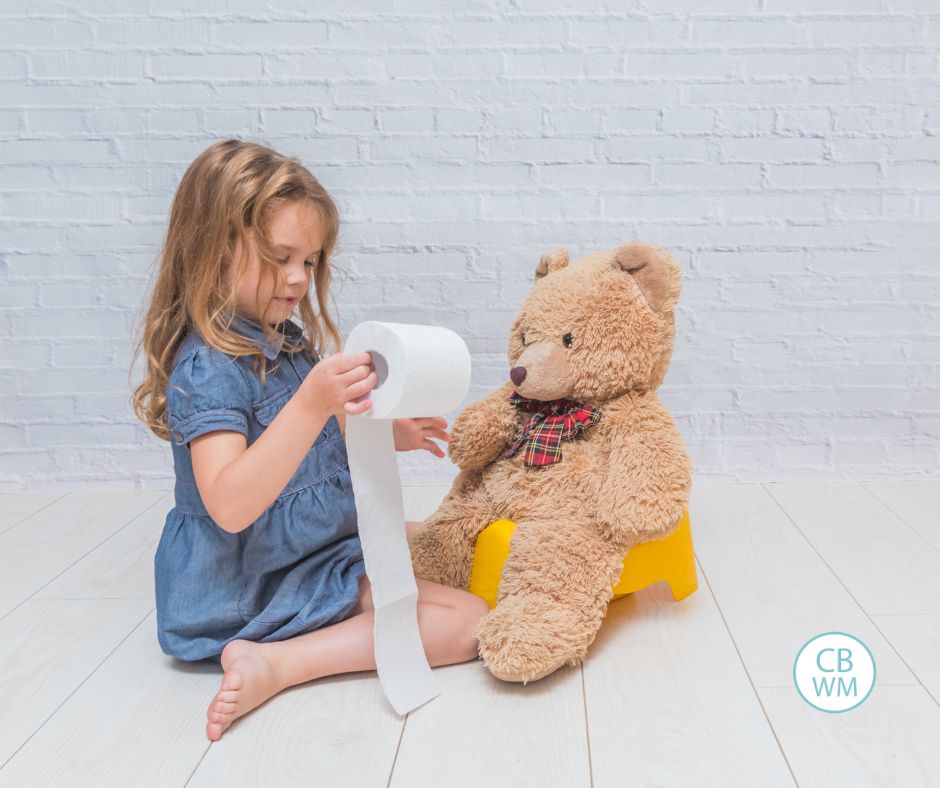Potty training going backwards? Don’t panic—regressions are common for toddlers. Learn the top causes of potty setbacks and simple, gentle strategies to help your child regain confidence and get back on track.
You thought you were past the hardest part of potty training, but suddenly your toddler is having accidents again. Potty training regressions are common and, while frustrating, they’re usually temporary. With patience, consistency, and the right strategies, you can help your child get back on track.
As if potty training itself wasn’t stressful enough, when a child has a “potty training regression,” you can feel like the rug has been pulled out from under you. You have lived the dream of no diapers, and suddenly you are left cleaning up accidents in underwear. The accident can have spilled onto the floor or couch… and this cleaning obviously is a much grosser and longer process than just changing a diaper.
IS IT REALLY A POTTY TRAINING REGRESSION?
Let’s be clear. A true regression is different than an accident here and there. Accidents can and most likely will happen. Your potty-trained child can get so engrossed in playing that he/she forgets to go potty. Your child can simply forget he/she is actually in underwear and not a diaper. Your child might have just waited a bit too long to make it to the potty in time. Just like a child who has been walking for a couple of years can trip and fall, a child who has been potty trained for a couple of months can have an accident here and there.
We also aren’t talking about a child who has never truly been potty trained continuing to refuse to move beyond diapers.
We are talking about a child who was fully potty-trained but is now having accidents multiple times a day. So how do you get a handle on the situation?
WHY DO POTTY TRAINING REGRESSIONS HAPPEN?
There are many possible reasons for a potty regression and accidents.
- Transitions and Changes: The most common reason for a true regression is a big transition. Toddlers and young preschoolers often have potty regressions when a new sibling comes home. It can be a new school, mom going back to work, moving, etc. Think through life and see if your child is facing any big changes in life right now.
- Constipation: If your child has a hard time pooping on the potty, he/she might avoid visiting the potty because the potty starts to become associated with pain.
- Bladder Infection: This is along the same lines as the constipation. A bladder infection can lead to accidents.
- Other Sickness: If your child has a sickness, it could lead to them neglecting the potty.
- Stress or Emotions: Toddlers often express anxiety or frustration through behavior.
- Too Much Pressure: Sometimes the stress of perfection makes them backslide.
WHAT PARENTS CAN DO
Fortunately, there are things you can do to address a potty training regression. You want to try to figure out the WHY for the regression and address that. For example, if it is because of a bladder infection (UTI), a trip to the doctor can help solve that and get your child back on track.
While you work on figuring out and addressing the “why,” do the following.
- Stay Positive, Calm, and Patient: Accidents are not defiance. Reacting with anger or disappointment can increase stress and worsen the regression. Scolding potty accidents is very rarely a helpful reaction. Chances are that your child will feel bad about the regression, and that feeling can be expressed in a variety of ways, from deciding potty training is stupid to hiding out. Be supportive and encouraging. Take a deep breath, clean up, and move on
- Focus on Being Clean and Dry: This method is discussed in Potty Wise. Success isn’t just in peeing or pooping in the toilet. It is also in staying dry. If your child is not putting effort into staying dry, offer small rewards for a time for being dry. Randomly ask, “Are you clean and dry?” Check. If the answer is yes, offer a small treat or sticker and cheer your child on for staying dry.
- Require Potty Breaks: If your child is having regular accidents because he/she can’t accurately predict how long it will take to get to the potty, institute a regular potty schedule and stick to it.
- Keep Routines Consistent: Toddlers thrive on predictability. Stick with regular meal, nap, and potty times to help them regain confidence.
- Offer Gentel Encouragement: Praise effort, not just success: “I’m proud of you for trying!” Stickers, small rewards, or a potty chart can motivate some children without adding pressure.
- Feed a Healthy Diet: Make sure your child is getting enough water and foods that help move along bowel movements.
- Go Back to Diapers: If your child really can’t handle underwear for now, just go back to diapers and return to underwear when life settles back down.
- Practice Good Hygiene: Keep things clean. Help your child stay wiped and clean to avoid infections.
- Rule Out Medical Issues: If accidents are frequent, painful, or paired with other symptoms, check with your pediatrician to make sure nothing physical (like a UTI or constipation) is behind the regression.
- Give Extra Comfort During Transitions: If big life changes are happening, offer reassurance and extra attention. Your child may simply need to feel secure again before focusing on the potty.
- Just Keep Trying: Setbacks are common for children in all areas of learning. Your child may have had her ABCs perfect last week and this week seems to think she has never heard of letters. This is common for children. Just stay patient and keep on trying.
Most regressions resolve within a few weeks. If your child continues to struggle after a month or so, or if you’re noticing increased anxiety or fear around the potty, it may be time to talk to your pediatrician or get additional support.
CONCLUSION
Potty training regressions can feel like a big setback, but they’re actually a normal part of toddler development. With calm consistency, a little patience, and lots of love, your toddler will regain confidence and move forward again.
Remember: potty training is a journey, not a race.
Related Posts

This post first appeared on this blog in September 2015


